Research: Gen Z in the Workplace
What matters to young professionals at work — and what turns them off


Read here our 2024 research on Gen Z and the impact of AI on their skills. Discover whether AI is an obstacle or a catalyst for Gen Z’s skills and learning.
The workplace is on the brink of a new shakeup. Generation Z — the most diverse and educated age group in the U.S. — is entering the workforce. Born digital into a connected world while spending half its waking hours on screen, Gen Z is shaped by internet culture and social feeds. Witnessing social justice movements, shunned gender issues, and exploitation of natural resources from early on, they have developed a unique sensibility and a strong stance for equity and ethical business practices.
Bringing along their forward-looking aspirations into the workplace, young Gen Z professionals are about to shake up business-as-usual. But is the workplace ready for them? Not quite, according to the data from a new TalentLMS and BambooHR research.
More than 1 in 3 working Gen Zers find it difficult to cope with pressure and stress at work. With 91% experiencing at least one symptom of stress, they need better support from their employers. And not getting it will turn them into flight risk: Burnout and lack of work-life balance is the key reason for Gen Zers to quit their jobs, right after an unsatisfactory salary.
And when it comes to whether they feel fairly compensated for the work they do, 59% of employed Gen Zers believe they are.
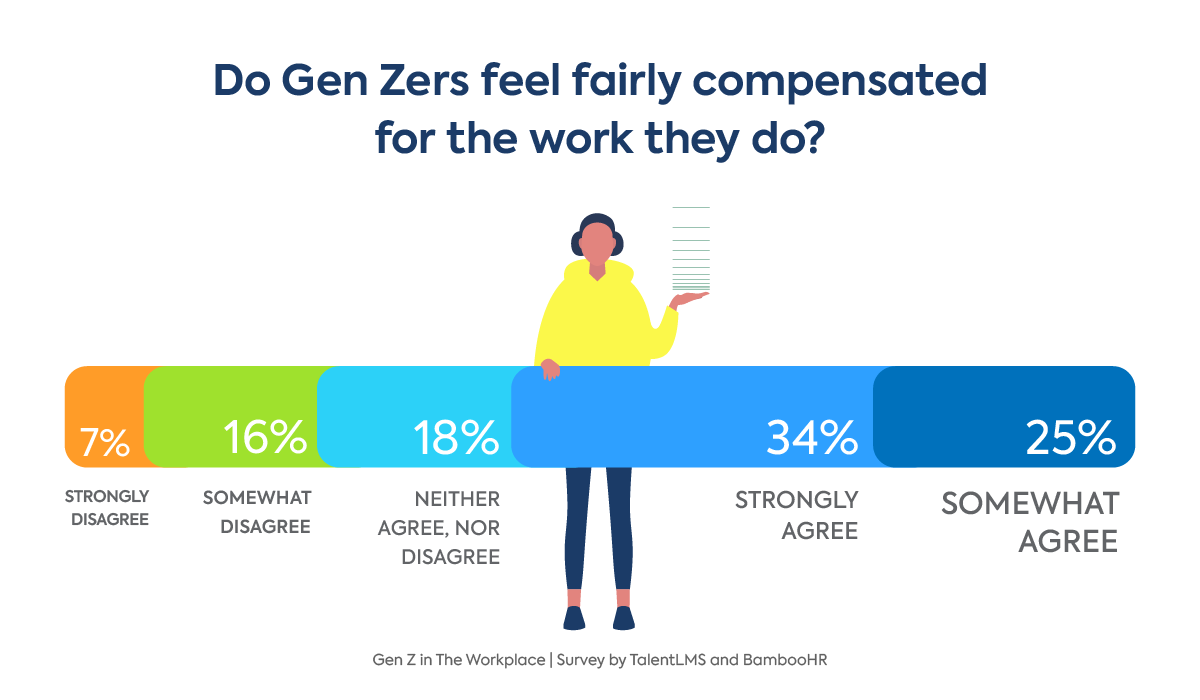
TalentLMS and BambooHR teamed up to zoom in on Gen Z in the workplace, and gain a deeper understanding of their views, expectations and needs. The survey examined 1,205 U.S. Gen Zers from 19 to 25 years old across industries, who have been working for at least six months.
The resulting insights can help employers connect with their youngest employees — and understand what they need to thrive at work:
Retaining Gen Z employees: What brings them close and what drives them away
Practical insights for employers on how to manage Generation Z
In-demand skills for young professionals and deal-breakers that’d make them quit their job
«If I was a CEO what would I change?»: Gen Z on how they’d handle leadership
Key findings
82% of Generation Z employees find it important to have mental health days while half want mental health training.
77% find it important to work for a company that cares about diversity, equity and inclusion.
A great place to work for 76% of Gen Zers is one with caring, friendly, and socially conscious people.
31% of young pros find it difficult to cope with pressure and stress at work.
64% of Gen Zers are satisfied with how well their education has prepared them for the workplace.
Over a quarter of Gen Z employees will likely quit their job in the next 12 months.
Why would Gen Zs quit their job:
1. Unsatisfactory salary (54%)
2. Burnout and lack of work-life balance (42%)
3. Not doing what they are passionate about (37%)The top trait that Gen Z workers value in leaders and managers is empathy and honesty.
The majority of employed Gen Zers prefer a hybrid work model.
In-person socialization with their colleagues is important to 7 in 10 Gen Zs.
3 in 10 employed Gen Zers have not received workplace training.
59% of Gen Z workforce believe they are compensated fairly for the work they do.
Education gap: Are young professionals prepared for the world of work?
Before the pandemic hit, Generation Z was on the track to becoming the most educated generation in the U.S. yet. But looks like COVID-19 may have set back their academic progress.
The majority (58%) of the Generation Z employees, surveyed by TalentLMS and BambooHR, hold higher-ed and post-secondary degrees. However, the conversation on whether higher education still prepares people for work continues. And in times of unpredictable job evolution, it is more relevant than ever.
This is why we examined young professionals’ views on how well education aligns with the world of work. The responses unveiled that only 64% of working Gen Zers are satisfied with how well their education has prepared them for the workplace.
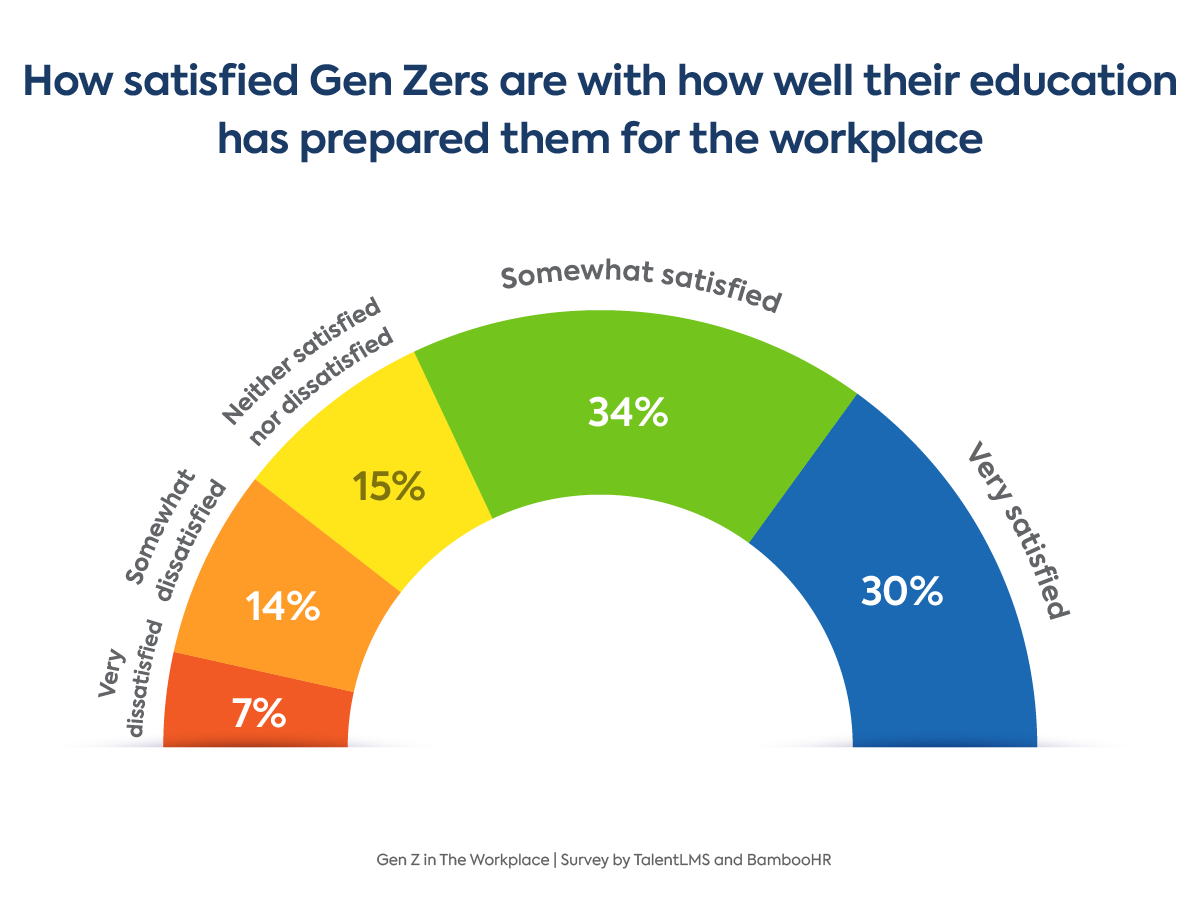
The gap appears even wider for those with advanced academic degrees: 1 in 4 Gen Zers with post-graduate studies are dissatisfied with how well their education has prepared them for the workplace. This may not come as a big surprise, since the most valued skills by employers in today’s job market revolve around people skills or soft skills, such as communication, collaboration, critical thinking and leadership.
Expectations vs. reality gap
Job expectations may vary on whether young professionals are spontaneous dreamers or goal-driven doers. Recent research suggests the latter, finding that the Gen Z cohort has well-defined career expectations. Either way, it seems like the reality is not reflecting their hopes in terms of salary, values or connectedness. Overall, 61% of working Gen Zs agree that their job and employer are meeting their expectations.
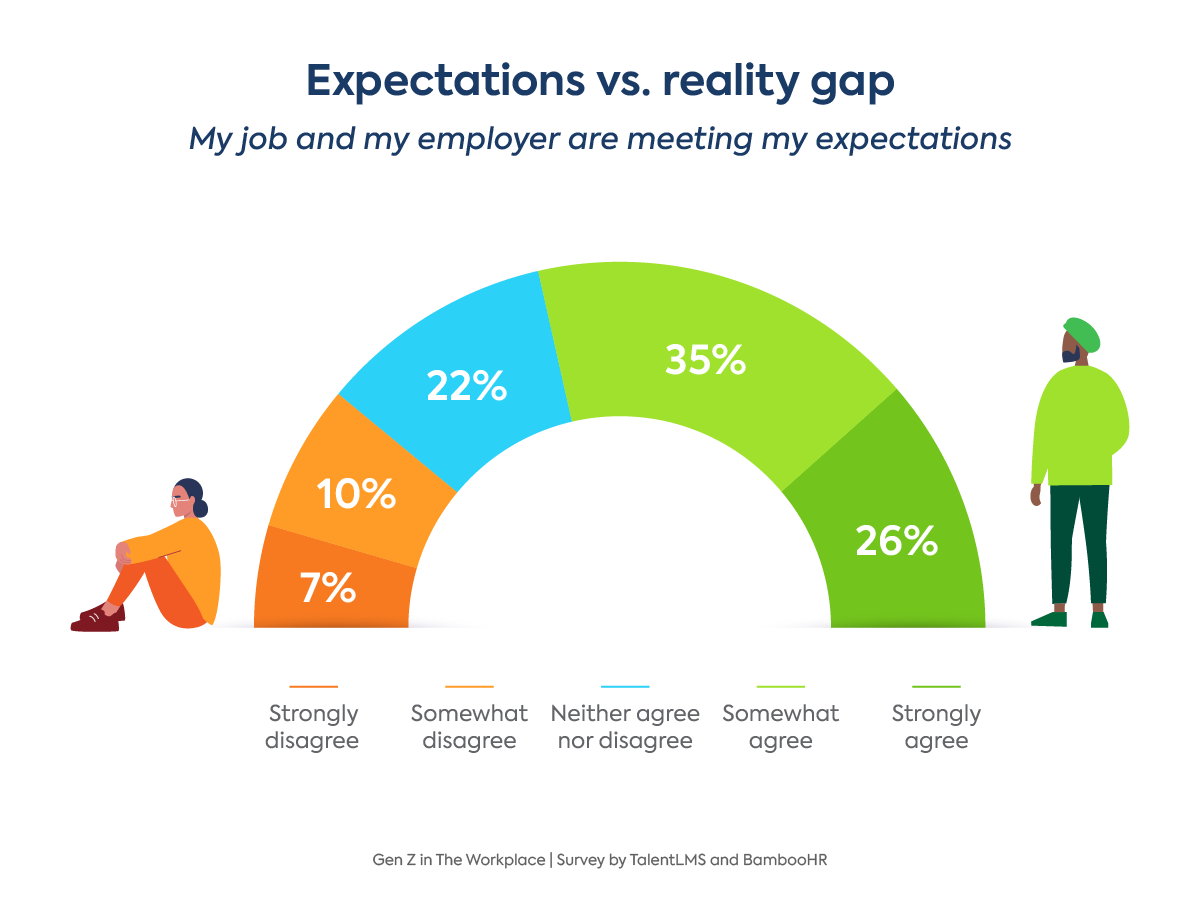
Are Gen Z employees compensated fairly for their efforts at work?
Even though Gen Z values salary less than any other generation, it is still the most important factor in deciding on a job. But only 59% of employed Gen Zers believe they are compensated fairly for the work they do. Since salary tops the list of reasons that’d make the youngest employees quit — as we’ll see down the report — this should be considered by employers who count on keeping their young talent around.
Young professionals want to work in companies that share their values, but are employers aligned?
Gen Zs appear to be socially conscious, prioritizing environmental issues and sustainability. From a commitment to DE&I to social and environmental responsibility, they are pushing companies to take action: 58% want their company to be more environmentally responsible. And 68% find it important to work in a company that is actively committed to social causes.
Along with requiring action from others, they don’t shy away from making changes in their own lives to live up to their values. For instance, 75% have bought second-hand clothes to reduce consumption.
Isolated and disconnected: The dream of remote work clashes with lonely reality
For a big chunk of entry-level employees who entered the workforce after March 2020, remote work is all they know. It can be one of the reasons that 73% of Gen Zs report feeling alone sometimes or always.
While remote work may be a dream come true for professionals with established careers and networks, for young people who are just starting out their work-life this may not be the case. TalentLMS and BambooHR survey found that 44% of working Gen Zers agree that remote work can make them feel lonely and disconnected.
What matters to Generation Z at work
To create meaningful connections with the newest generation, HR teams need to throw out their dusty employee handbooks and create a workplace that reflects their values. Gen Zers have high self-awareness and are not shying away from being real and speaking freely about their vulnerabilities. With their transparency on mental health issues, sensibility to injustice, and demand for equity and sustainability, today’s youth is paving the way for a more humanized and responsible workplace.
Keeping mental health in check
As stress levels keep rising on a global level, the normalization of mental health issues at work has replaced the stigmatization that used to surround them. Gen Zers seem to be more open about their struggles, since they are significantly more likely to seek professional help for mental health issues than past generations, as the American Psychological Association reports.
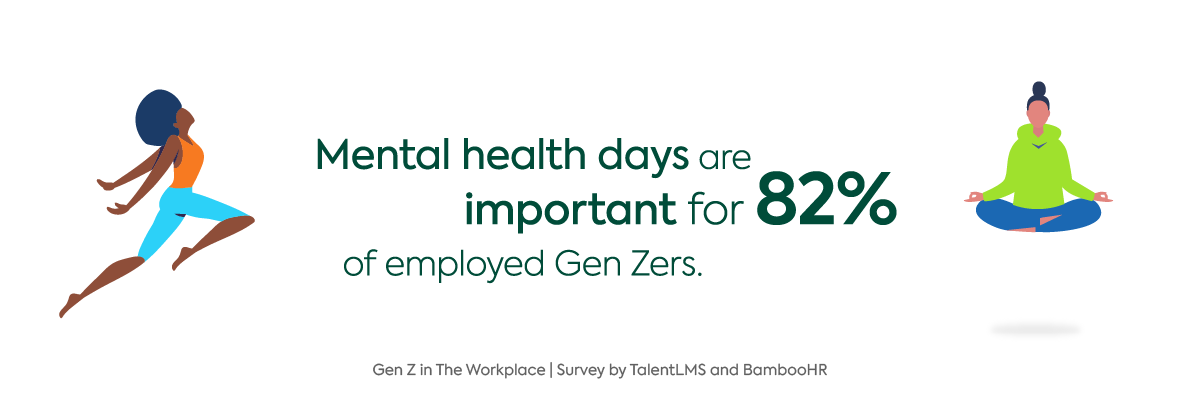
The TalentLMS and BambooHR survey findings echo that mental health is a major concern of Gen Zers: Half of the respondents want to receive mental health training from their employers while over 8 out of 10 want mental health days at work.
Thus, stress is taking a toll on the young workforce: 31% find it difficult to cope with pressure and stress at work. At the same time, keeping a work-life balance is difficult for 28% of respondents.
An equal, inclusive and socially responsible workplace
For young professionals, diversity and inclusion aren’t a preference. They’re a requirement. And our research confirms this commitment: 77% of surveyed Gen Zers find it important to work for a company that cares about diversity, equity and inclusion. Unlike previous generations who were bringing their depersonalized self to work, young professionals are openly expressing their values and expect their employers to align with them.
Workplace relationships and socializing in-person
Even though Gen Zs are digital natives, survey data paints a different picture from the stereotype that wants them more inclined to socialize virtually.
When it comes to the workplace, 7 in 10 Gen Zs find it important to have in-person socialization with their colleagues, while 59% feel the same for virtual socialization.
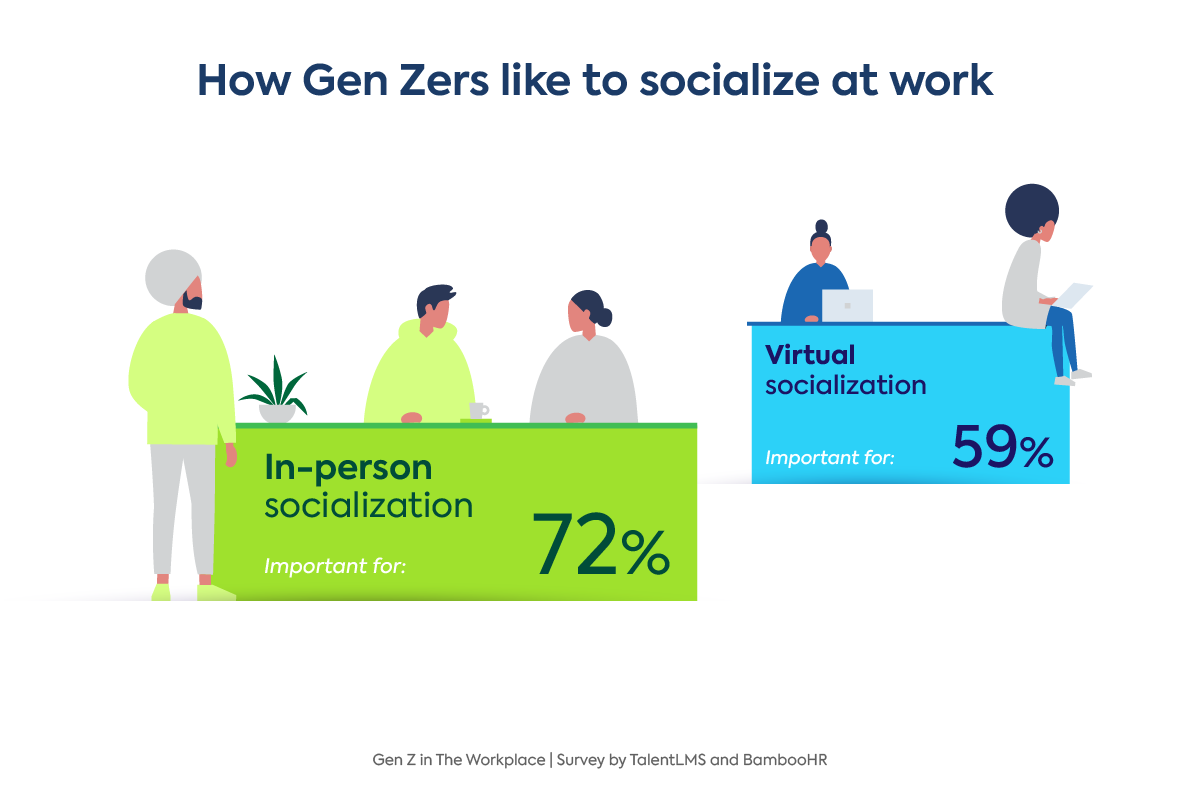
Whether IRL or virtual, socialization and building relationships at work are important for entry-level employees. As they’re entering the workplace for the first time, the bonds and connections they create are forming a support network to help them get through a difficult start. As the survey data shows, not having bonds or relationships with colleagues at work is a reason to quit for 19% of Gen Zers.
Flexible workplace and a hybrid work model
Flexibility in when and where they work is important for 81% of Gen Z employees. And the majority prefer a hybrid model which combines remote and office work.
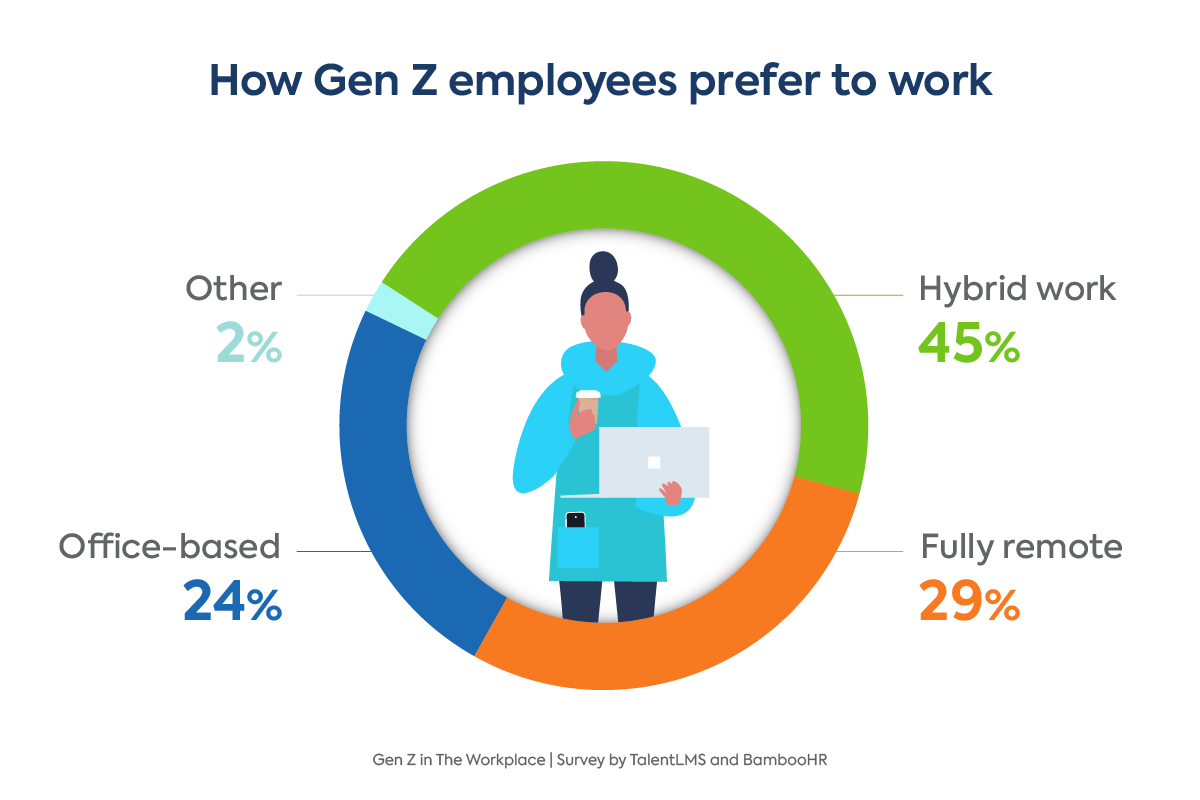
Cracking the code to Gen Z retention: What brings them close and what drives them away
Entering the workforce in the midst of the Great Resignation/Great Reshuffle — with a plethora of opportunities on the job market — has given an advantage to young pros. They have more edge in job negotiation than previous generations had so early in their careers. Quitting publicly on TikTok, Gen Zers are striking fear into their potential employers, keeping them on their toes.
Are young adults job-hopping?
Research after research finds that young talent is on the move. According to Adobe, 56% of Gen Zs are planning to switch jobs in the next year, while Bankrate reports a more dramatic number of 77% planning to look for a new job.
However, the TalentLMS and BambooHR survey of Gen Zers — who have been working for the last 6 months — paints a slightly more optimistic picture: Over half of them said it is unlikely they’ll change jobs in the next 12 months. On the flip side, a quarter of Gen Z employees will likely jump ship this year.
While right now multiple generations are working together, Gen Z’s portion of the workforce will only grow in the following years. With the Great Reshuffle being far from over, this generational shift may play a key role in how it all pans out.
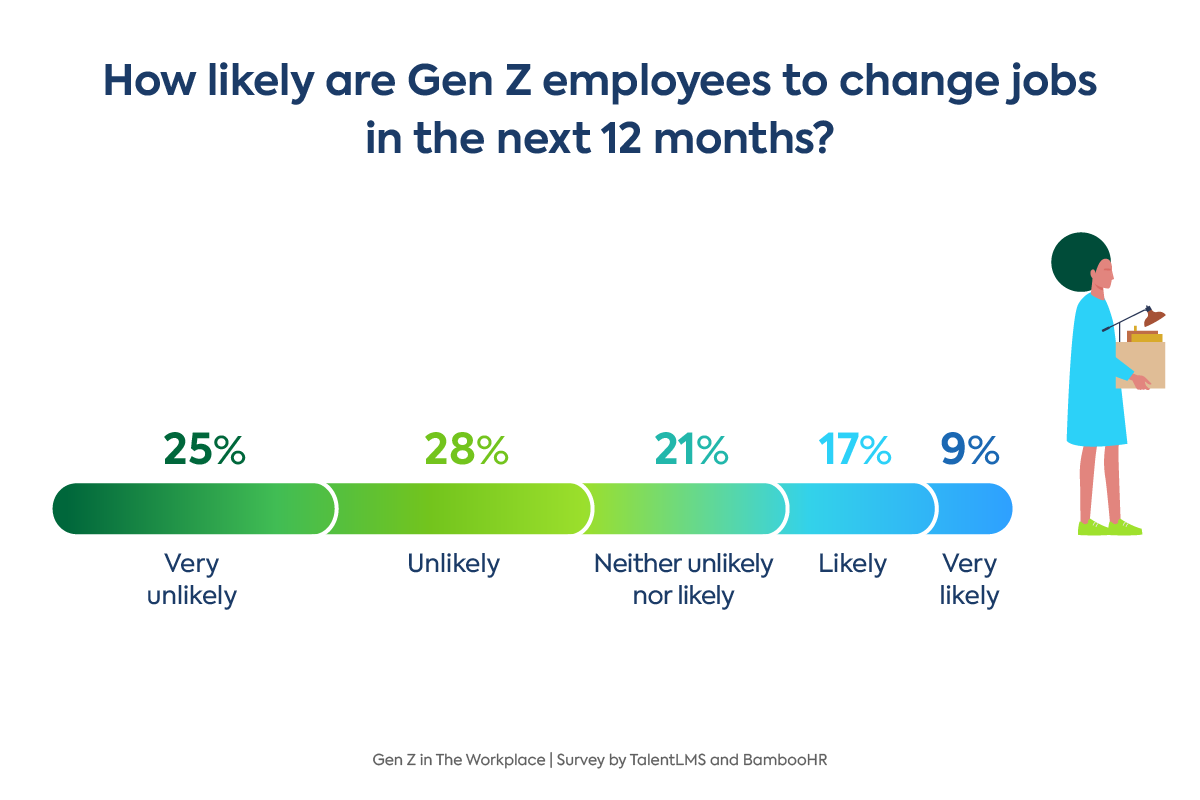
Deal breakers for Gen Zers that’d make them quit their job
When it comes to the reasons why young talent is leaving their companies, they place the highest importance on salary (54%) and work-life balance (42%). Additionally, not doing what they are passionate about is the #3 reason to quit.
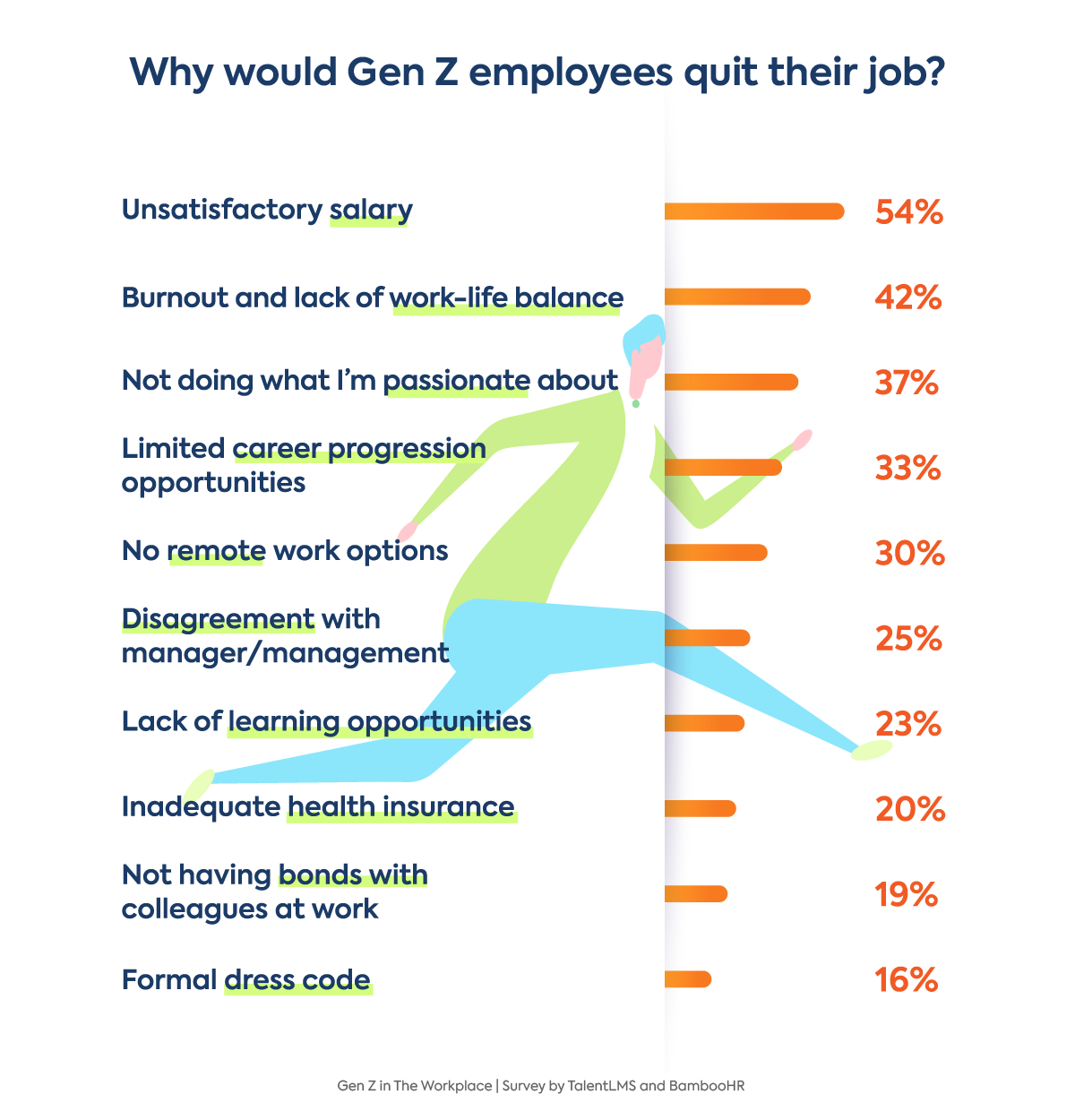
Train them to retain them: Lack of learning opportunities will make Gen Zers a flight risk
Learning opportunities are a top factor in Gen Z’s job hunt — showing that Gen Zers prioritize career development and find learning benefits highly appealing. So, it makes sense that learning opportunities can play an important role in retaining young workers.
Gen Zers who didn’t receive workplace training are more likely to quit than those who received training, TalentLMS and BambooHR research finds. This shows that learning benefits can be a powerful ally in combating the great reshuffle.
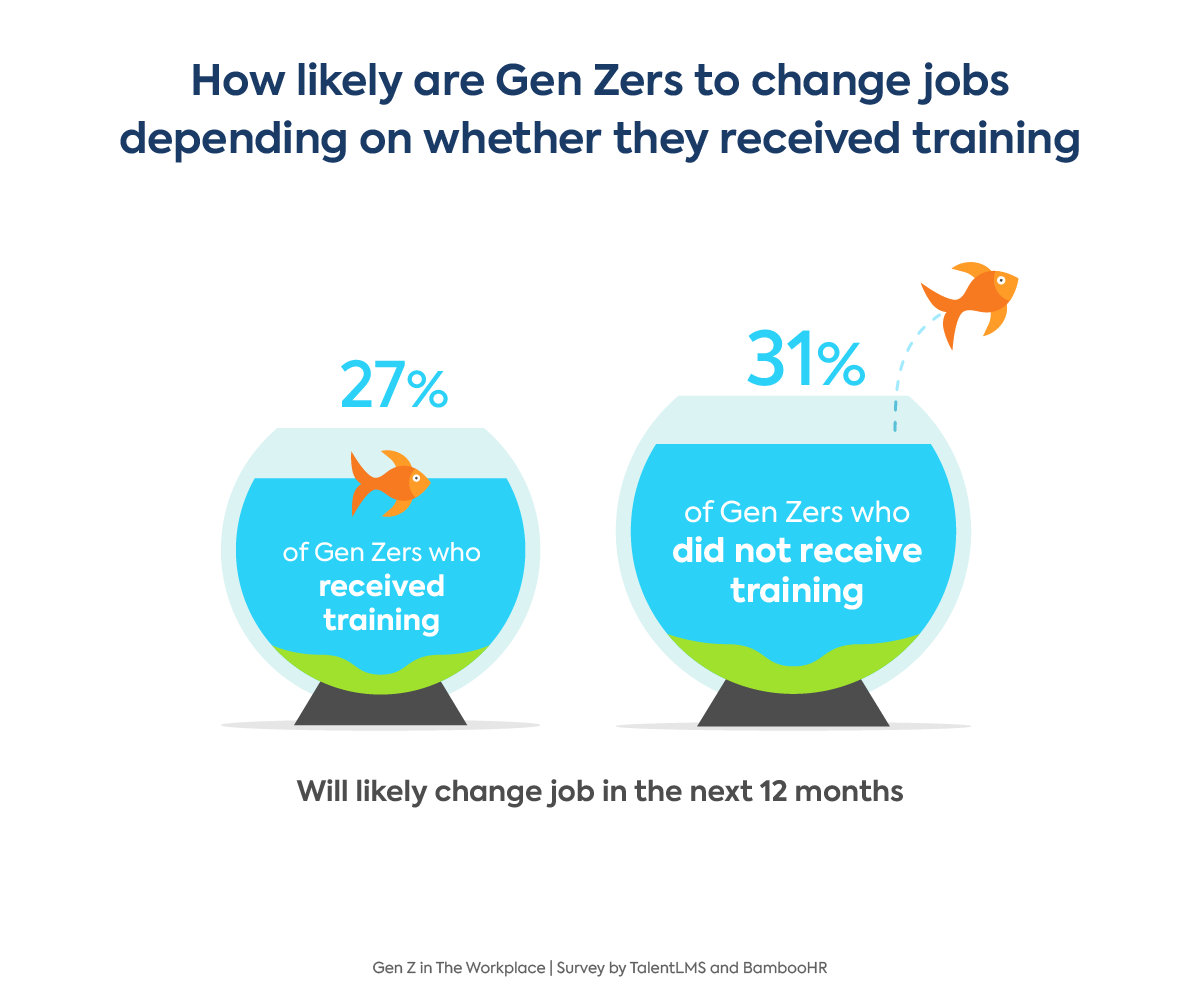
Practical insights for employers: How to ramp up Gen Z in the workplace and set young talent up for success
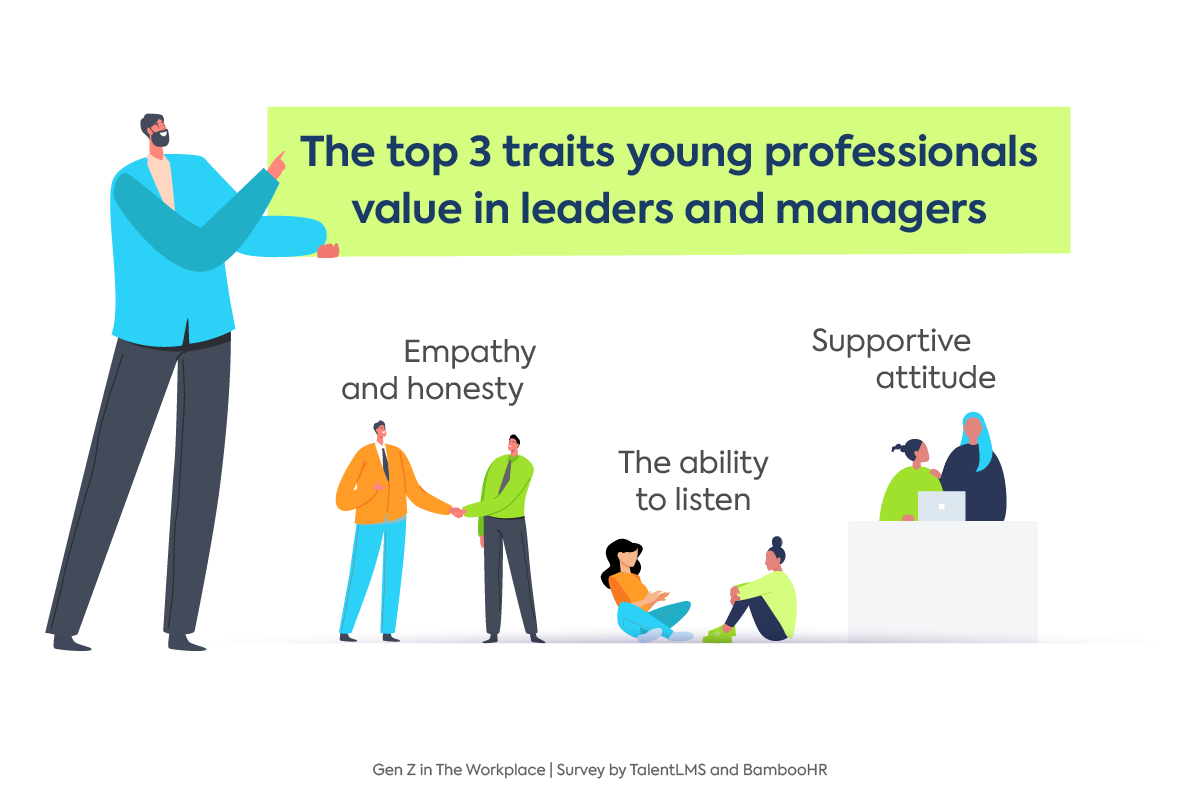
Managing Generation Z: Lead with empathy and honesty
We asked Gen Zers what they value the most in a leader. Empathy and honesty top the list, showing the way on how to manage Gen Z employees. The new generation wants their leaders to be transparent, supportive, and listen to what they have to say. For managing Generation Z successfully, their supervisors need to embrace the new values young adults are bringing in the workforce, and adjust the leadership style.
Don’t let their potential remain unrealized
64% percent of Gen Zers find it easy to deliver on expectations at work, our research showed. That indicates they’re not challenged with higher-level tasks. Don’t let your young talent be underutilized: bring out their full potential by signing them up for more challenging tasks and showing you have higher expectations.
Develop their leadership skills
Young professionals appear determined to grow into leaders and managers. The most in-demand skill for Gen Zers is leadership, which topped the list of the desired type of training for half of them.
Work out a well-defined career path
As we’ve seen, Gen Z have well-defined career expectations and they want to see growth potential in their current roles. If they don’t, they’ll likely leave. For 34% of surveyed Gen Zs, limited career progression opportunities are a reason to quit their job.
Walk the talk and keep it real
The youngest employees can smell ‘woke washing’ a mile off — along with greenwashing and lip service, which are a major turnoff. Today’s youth want to connect with companies and brands that align with their values, but the commitment needs to be genuine. Trying to ride the trend wave without doing something real about it won’t cut it for Gen Z.
Cut down on long meetings
Staying focused during long meetings is difficult for 34% of Gen Zers.
Workplace learning
Not all Gen Z employees are getting training at work
Given how much Gen Z cares about career development, it’s alarming to see that close to 3 in 10 working Gen Zers have not received workplace training. On a more positive note, the majority of those who received training from their employer are satisfied with it (73%). Finally, a recent research on the state of Learning and Development has shown that almost half of companies offer training for new graduates — who are just entering the workforce.
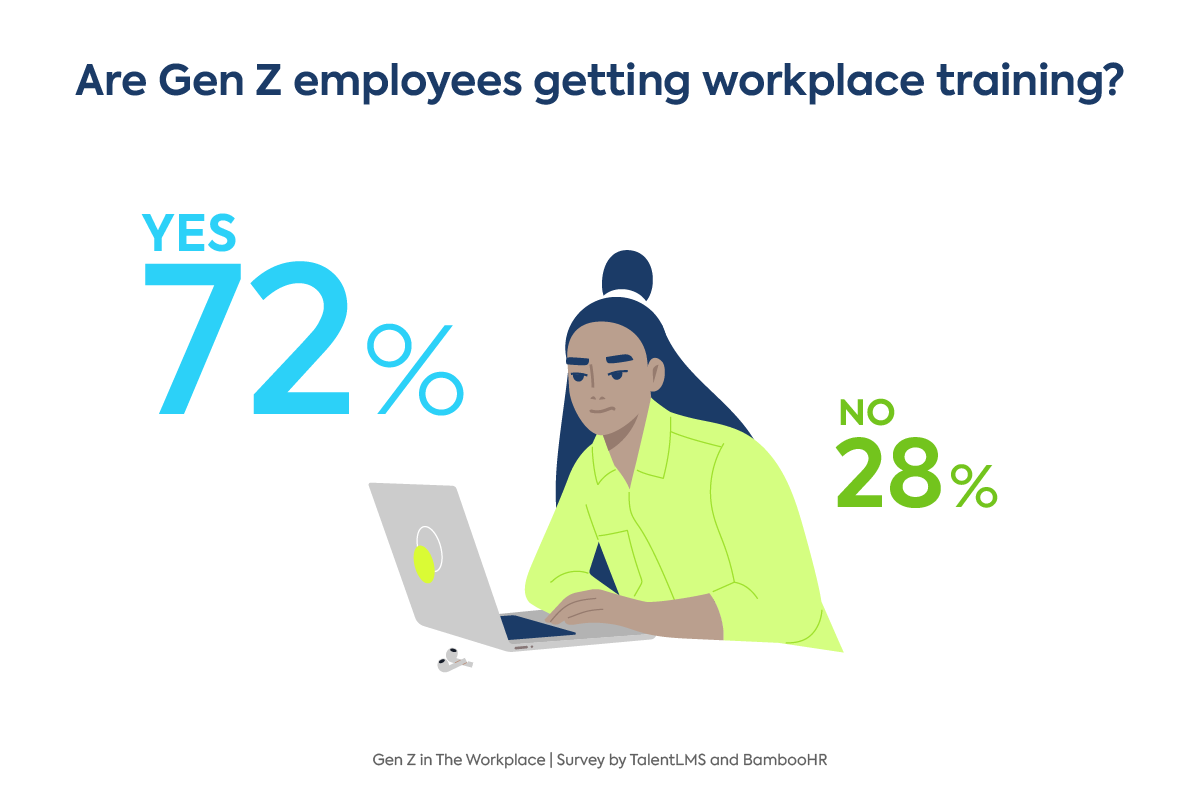
In-demand skills for Gen Zs: Leadership, soft skills, and life skills
As for what skills young professionals want to build, leadership/manager training has topped the list for the majority of respondents. That shows the strong inclination of young pros to leadership and career advancement. Soft skills are the runner-up, followed by mental health training — both of which almost half of the young pros want to get at work.
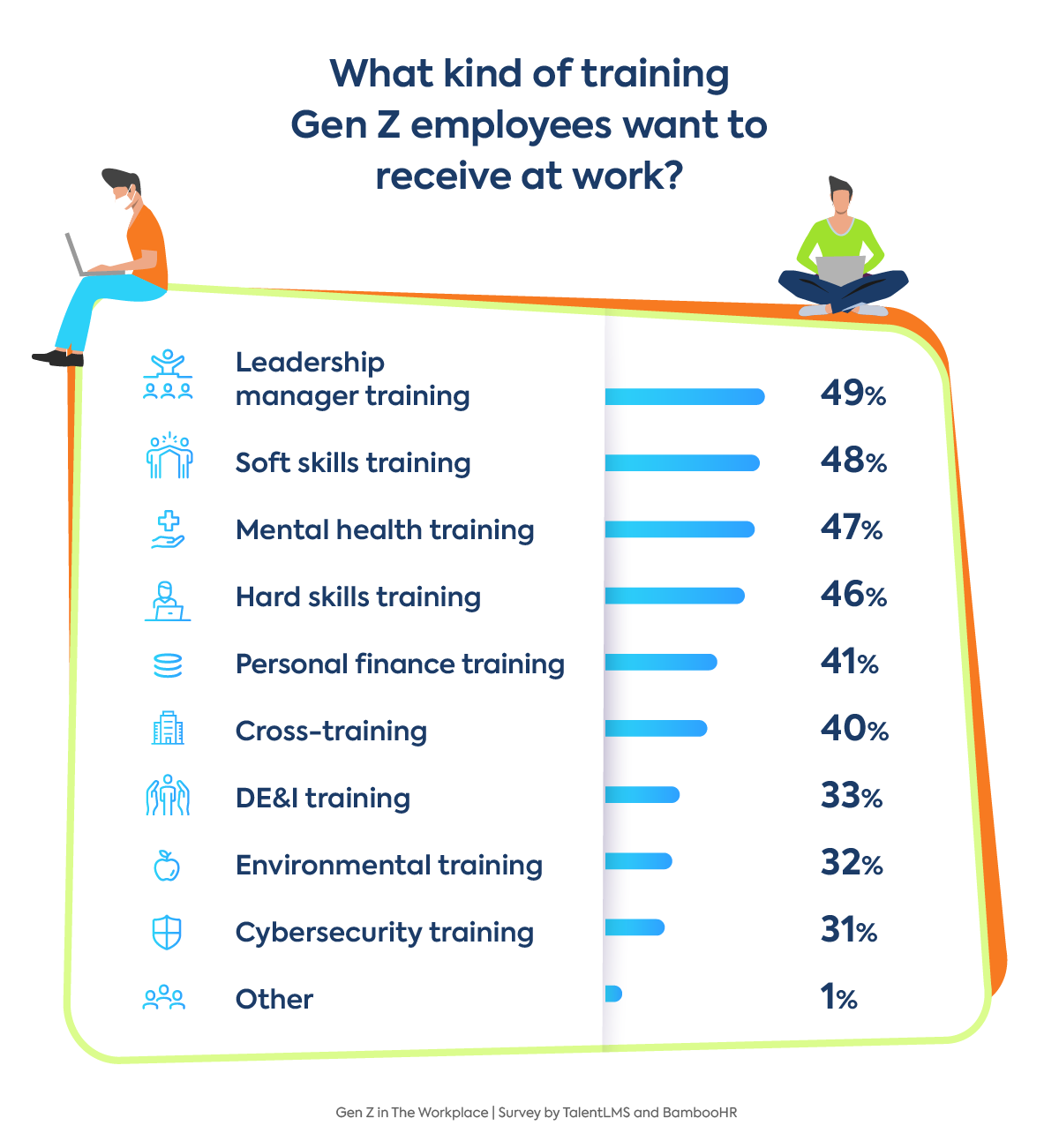
How to train Generation Z at work
Smart companies are investing in training and developing their young talent to nurture and engage them in the long run. Here are research-backed insights on how to create compelling and engaging training for young adults.
Offer training via smartphone
62% of Gen Zs want to access and complete training from their smartphones.
Break down training into shorter sessions
63% agree that they’d remember more of the material if training was broken into shorter sessions.
Make training immersive
59% would learn better and faster if training was immersive.
Include loads of videos in training content to engage Gen Zers
For 56%, training would be more engaging if there were more training videos in the learning material.
Gamify training
56% would enjoy training more if it was gamified.
Engage your learners with competitions, quizzes, and badges.
Gamify your training programs with TalentLMS.
Easy to set up, easy to use, easy to customize.
Onboarding training: Smoothing the transition for new hires
Entering the workforce and starting out on a first job can be intimidating. That’s where a thorough onboarding process comes in, to smoothen the transition for new hires and help them power through.
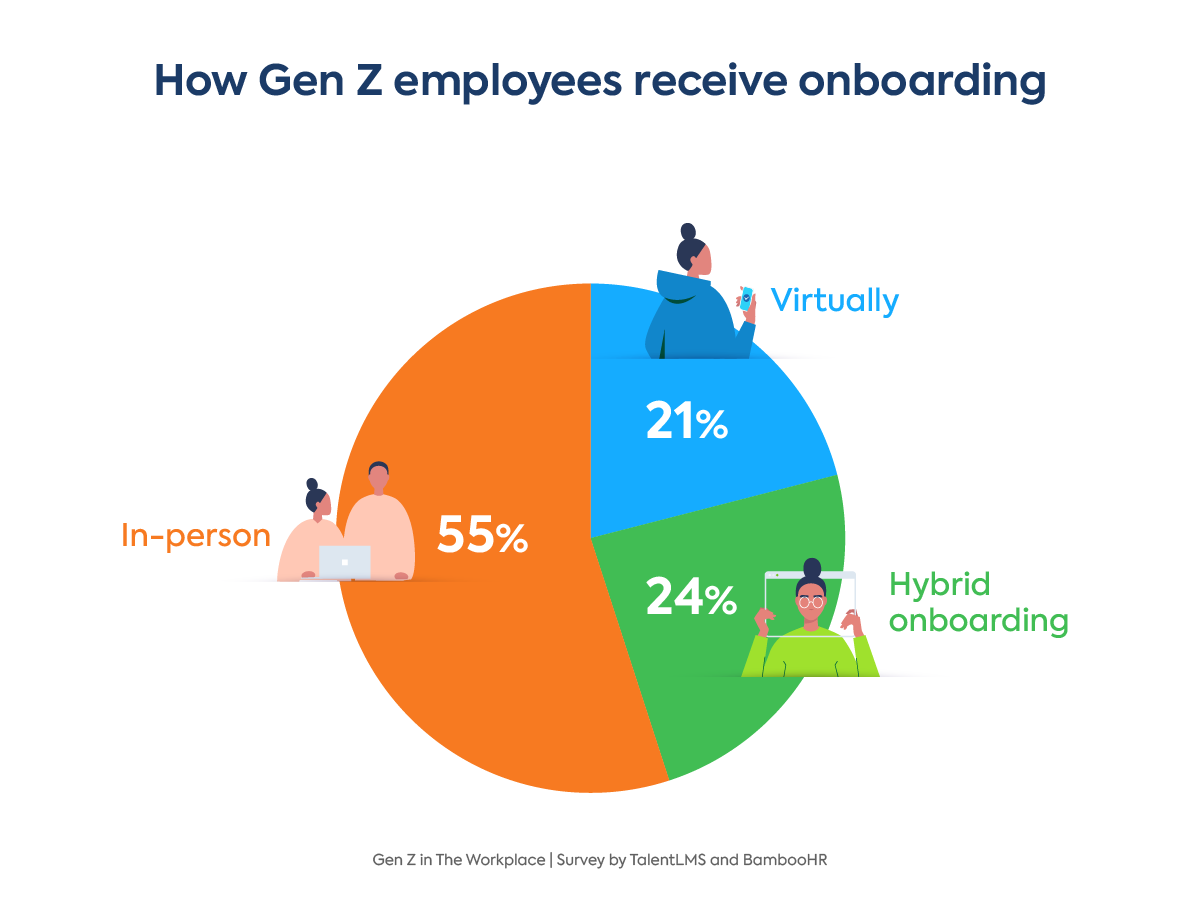
Our research has found that 85% of Gen Z employees have received onboarding training. As for how well the onboarding process is designed, the respondents reported a high level of satisfaction: 69% are satisfied with the onboarding they received. However, there’s still room for improvement and aligning in-person and virtual onboarding experience — since 1 in 5 Gen Zers were onboarded virtually.
More interesting onboarding finds:
- 62% of Gen Z employees agree that the onboarding they received has equipped them with resources and skills to do their new job well.
- 67% agree that onboarding made them feel welcome and valued in their new company.
- 62% agree that onboarding has reduced their anxiety as new employees.
What constitutes a great place to work for Gen Z employees
Where caring and socially conscious people work
Young adults want their peers, managers and executives to care. They want them to be friendly, caring, and aware of the world around them. Gen Zs bring their values for social justice and environmental change to the workplace. And an organization that nurtures and reflects those values is a great place to work for them.
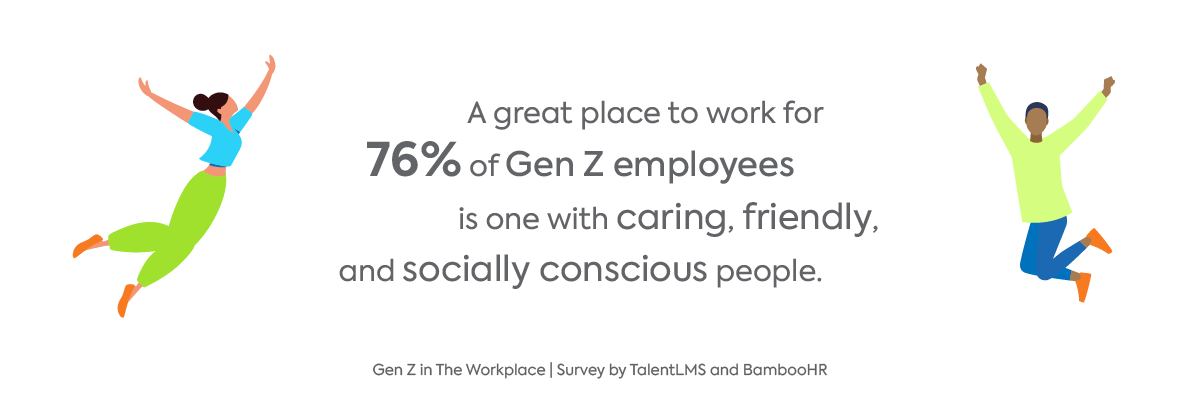
No labels: Where they are allowed to be expressive and authentic
75% of Gen Z say their race, gender or sexuality cannot be easily categorized, a study by Disney showed. They don’t accept being limited by traditional views on gender and personality, and want fluidity and freedom. And our findings mirror how much they value expression: 73% of Gen Zs agreed that a great place to work is one where people are allowed to express themselves freely, and be authentic and spontaneous.
Where work-life balance is nurtured
Burnout and lack of work-life balance is the key reason Gen Zers would quit their job, right after unsatisfactory salary – TalentLMS and BambooHR survey has found. Keeping stress at bay and prioritizing mental health is an imperative for early professionals. Employers acknowledging and taking action on that will create a workplace where Gen Zers will thrive.
“If I was a CEO”: Gen Z on how they’d handle leadership
Closing the survey, we asked Gen Zers to tell in their own words what would they change in the workplace if they were a CEO. Here are some common themes in their responses.
Give voice to everyone
«If I were CEO I would make sure everyone had a voice.«
Equal opportunities for all
«If I was a CEO, I would remove the barriers of the social ranking at work. So we can all equally work and thrive together.«
Healthy work environment
«I would dismantle the ways of the traditional workplace and create a more healthy fulfilling environment.«
«I would make sure everybody respect and care for others.«
The vibe
«The vibe, I think the vibe is extremely important, probably top 3 in the workplace.«
Stop discrimination
«I would make sure that there are consequences for discrimination.«
Kill the caste system
«I’d change the feeling of a caste system between the highly certified professionals at the job and the not so skilled workers.«
Environment-friendly business practices
«I would find ways to make the company more sustainable and environmentally friendly.«
Prioritize mental health
«I would allow employees to take breaks as needed and have mental health days separate from vacation and sick days.«
«Allow employees more time with family on holidays and events, offer mental health days and no dress code.«
Eliminate the pay gap
«Smaller gap between my pay and that of the employees below me/more balance.«
«The pay gap between men and women.«
Fun and enjoyable workplace
«I would make the place more fun and enjoyable as much as I possibly could so my employees would enjoy coming to work.«
Allow flexibility
«Let employees choose whether they want to work remotely or at the workplace.«
Allow authenticity
«I’d change the fact that they judge the way someone works based on their piercings or tattoos. I’d change it to it not mattering.«
Relationships at work
«More sense of community at the office, have teams be based in the same location so they can meet in person.«
«If I were a CEO in my workplace, I would have more team-bonding days, where the whole team and the supervisor go on trips to bond and have a closer connection outside of the workplace.«
Appreciate employees
«I would make the environment more friendly and welcoming. I would give positive feedback to people and let them know they are appreciated. I would also raise salaries.«
«I would show my employees appreciation. Employees don’t leave companies, they leave management.»
Conclusion
This survey has unveiled a generation of highly-aware individuals with intertwined traits of doers and dreamers: having sensibilities on social and environmental issues, Gen Zs don’t shy away from buckling down and taking action. In summary, they are ambitious and have high career expectations, but they prioritize well-being and are not willing to give up their work-life balance to enter the rat race.
As young adults are finding their footing in the workplace, they’re enriching it with fresh perspectives and energy. And who knows, maybe they’ll be the ones to flip the script and enable the shift from a profit-centric work model to the people-centric workplace of the future.
About the survey
The 1,205 survey respondents ranged from 19-to-25-year-old Gen Zers from the U.S. across industries, who have been employed for at least 6 months. The survey has been conducted online between March 25 and April 3, 2022.
Education level of the respondents:
Middle school: 3%
High school: 39%
Vocational/technical college: 12%
University: 37%
Post-graduate: 9%
Research team
Ana Casic (TalentLMS), Eri Panselina (TalentLMS), Gina Lionatos (TalentLMS), Kayla Fay (BambooHR)
Train your people. Measure results. Drive growth.
TalentLMS gives you the tools to supercharge every step of your training.





